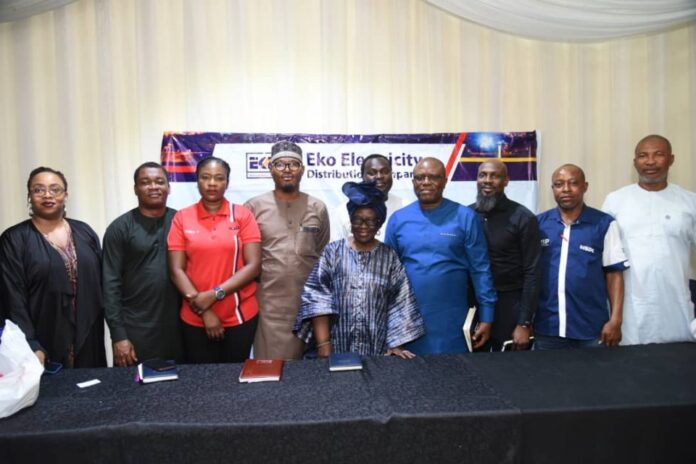MAP: Eko Disco reiterates commitment to effective metering
**** Orders MAP vendors to stock minimum of 2,000 meters
By Chigozie Amadi
The Eko Electricity Distribution Company (EKEDC) has mandated Meter Assets Providers (MAP) scheme vendors to maintain a minimum inventory of 2,000 smart prepaid meters, physically available, before they are permitted to sell and install meters for new customers.
Mrs Rekhiat Momoh, the Acting Chief Executive Officer of EKEDC, made this known during the company’s townhall engagement forum with customers under the Lagos Island and Victoria Island.
Momoh was represented by Mr Samuel Edoho, EKEDC’s General Manager, Commercial (Revenue Cycle), said that the process was in preparation for the re-launch of its prepaid meter scheme.
She said that this was part of EKEDC’s plan to enhance the efficiency and reliability of the meter procurement and distribution process.
She emphasised that EKEDC is committed to streamlining the process and providing a more seamless experience for customers seeking to acquire prepaid meters following the deregulation of the MAP smart metering price by the Nigerian Electricity Regulatory Commission.
Momoh insisted that the new and existing MAP vendors must have a substantial inventory of prepaid meters on hand, which will be physically verified by EKEDC before they can be allowed to accept payment from customers.
She said that the first priority of the company was to massively install prepaid meters in residents of customers who had paid but have not been metered.
She said, ” The deregulation of the prices of smart meters deployed under the MAP scheme, effective from May 1, 2024.
” This is a move that aims to enable our customers to acquire meters from vendors of their choice based on competitive open market prices determined through transparent bidding frameworks, which will be carried out monthly based on market indices.
Momoh further elaborated that the enumeration of customers is ongoing to determine the number of unmetered customers, particularly those on Band A.
“Additionally, EKEDC has set conditions for MAP vendors, including that they must clear outstanding meters before selling to new customers.
“Meet specific standards for registration and operate within the network using 4G-enabled meters.
The EKEDC Acting MD also clarified that NECAN is only authorised to install prepaid meters for new customers or those separating from existing properties, and existing customers will have their installations delayed for a week due to inspections and enumeration.
Addressing issues of persistent vandalism and stealing of distribution equipment, Momoh stressed EKEDC’s firm stance on combating energy theft and meter bypass.
She highlighted the imposition of penalties and sanctions on offenders, with a commitment to recovering lost revenue through legal measures.
She solicited customers’ support in the company’s fight against vandalism, meter tampering, and theft, affirming EKEDC’s zero-tolerance policy regardless of the perpetrator’s status.
According to her, EKEDC has partnered with the 81 Division and Nigerian police in Victoria Island to patrol and safeguard electricity equipment.
She said, “To prevent vandalism and theft, EKEDC has strategically deployed security personnel to combat the activities of the vandals.
“We are therefore urging customers to report suspicious activities promptly to prevent widespread disruptions,” she said.
Addressing customers demand for Band A upgrades, Momoh stated that EKEDC’s goal is to migrate all customers, from as low as Band E, to the higher Band A service level with guaranteed availability.
She added that significant investments have been made in the Victoria Island-Lagos Island axis to increase service reliability, with many Band B customers now enjoying over 16 hours of power supply.
The Acting MD of EKEDC further explained that the ongoing exercise of upgrading customers from Band B to Band A is contingent on meeting the service level mandates set by NERC.
She said, “We will continue to recommend feeders that have consistently achieved a minimum of 20 hours of power throughout a month to NERC for Band A upgrades.
“As a service provider, EKEDC can only make these recommendations to the regulator after ensuring the feeder meets the 20-hour supply criteria for Band A migration.
EKEDC’s MD also emphasised the company’s dedication to enhancing power supply, particularly for premium customers in the Victoria Island-Lagos Island district.
She stated that relying solely on grid supply was not sufficient to guarantee a consistent power supply to all customers in the Service-Based Tarriff regime.
She said, “To address this, EKEDC is focusing on bilateral power arrangements and generation to ensure the sustainability of supply to premium customers and maximize available grid capacity.
On downgrading certain feeders to Band B and C, Mr Babatunde Lasaki, EKEDC’s General Manager, Corporate Communications said that NERC has the authority to downgrade a feeder’s service level if the DisCo fails to meet the minimum threshold of 20 hours of supply.
He said, “In such cases, EKEDC will therefore notify affected customers of the downgrade.
“The company’s aim is to avoid charging customers for a service level they are not receiving and instead focus on improving its equipment to meet the required service thresholds.
Lasaki further explained that if the performance of a downgraded feeder improves, NERC will review and upgrade it accordingly.
Mr Gbadebo Akinyede, EKEDC’s Head of Metering, on his part, announced that the metering under the MAP scheme had been deregulated as at April 29.
According to him, it it allows MAP vendors to determine their own landing costs, and customers can choose from a range of 4G-compliant smart meters that meet EKEDC’s standards.
Akinyede also emphasised that under a deregulated environment, the price of a single-phase prepaid meter could be as low as N45,000, while a double-phase meter could range from N70,000 to N80,000, subject to monthly adjustments based on foreign exchange rates.
In her remarks, Mrs Wonu Folami, representative of the Victoria Island and Ikoyi Residents Association (VIIRA), commended the company for their swift response to fault clearance and supply issues.
Folami described the classification of customers into different bands by DisCos and NERC as “Apartheid and unfair,” implying that the system is discriminatory and unjust.
According to her, the disparity in service levels is discriminatory and unjust for some customers to be placed on Band A while others are on lower bands.
Folami also emphasized the urgent need for EKEDC to overhaul its ageing equipment, including cables, poles, transformers, and feeders.
She stated that continual repairs are unsustainable, adding that the equipment being frequently repaired by the DisCo is nearing the end of its operational life.
Folami further stressed the importance of upgrading the infrastructure to ensure reliable power supply to customers, highlighting the strain on engineers tasked with constant repairs of outdated equipment that should have been replaced.
She advocated a comprehensive overhaul with new and modern equipment to establish a harmonious relationship between DisCo and electricity consumers.
She said that this would ultimately improve service quality and reliability.
























